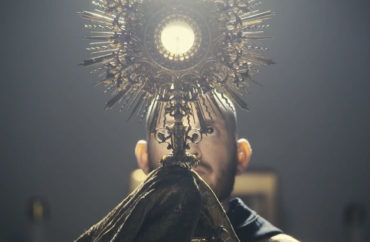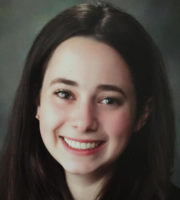
‘Hunger deeply for the bread of life’
Universities across the nation have been shutting down their campuses in response to the COVID-19 pandemic, and Catholic institutions are no different. Most of them have closed their doors, with students returning home to attend online classes in an effort to “socially distance” and help prevent the spread of the disease.
The pandemic has also essentially brought an end to the public worship of the Catholic Mass in the United States and very likely the world. Neighborhood parishes, cathedrals and campus chapels have all barred the faithful from attending Mass in them, with priests offering only privately celebrated liturgies for the duration of the outbreak.
Yet multiple campus chaplains are urging Catholics to remain faithful and strong in the face of the pandemic, pointing to different paths one may take to celebrating religious belief without attending a Mass.
The Rev. Dennis Smolarski, a professor at Santa Clara University and the school’s director of campus ministry, told The College Fix that Mass has been suspended essentially throughout the entire world.
“At this point, there are no public Masses celebrated anywhere in the United States, including Hawaii and Alaska, and there may be few countries anywhere in the world where public Masses are available,” he said.
“The only exception may be on some military bases and the U.S. Virgin Islands, and in religious communities where no one from the outside attends.”
Smolarski said there are multiple ways the faithful can mark Sunday as a holy day even if they are barred from attending Mass.
“Going to a communal worship service, such as a Mass, is only one part of keeping Sunday holy,” he said.
He cited “reading a reflective book, e.g., the writings of Pope Francis (such as the encyclical on ecology), or spending time learning how to meditate, or developing a talent, such as practicing an instrument, or drawing, or taking pictures of flowers in your garden.”
Magdalen College of Liberal Arts in Warner, New Hampshire, has also made the switch to online learning due to the pandemic. Yet this Catholic institution has still been very active in keeping students involved in the Catholic tradition.
Fr. Roger Boucher, the campus chaplain at the school, said that students continue to begin and end every online class with a prayer.
The students are also “working daily on the 33 Days of Consecration to Merciful Love…which will end with the Consecration on Divine Mercy Sunday,” Boucher said. “For this they are praying the rosary each day. We are working to do this by conference call.”
Boucher said that he celebrates Mass on campus every day per the request of the local bishop. Additionally, he sends out a homily to the student body as often as he can. The Blessed Sacrament—the consecrated host—still remains in the dorm chapels as well as the main chapel.
“We love liturgy very much at our school and practically the whole student body is in the choir,” he said. “We are usually here for Holy Week and Easter Week. We miss singing together.”
Even private Mass a ‘public’ event, one priest says
Holy Family University out of Philadelphia has also shut down. Campus Ministry Director James MacNew told The Fix via email that campus ministry has “recommended that students of various faith groups use online resources from their own faith traditions for ideas, programs, prayers and spiritual opportunities and suggestions in support of spiritual nourishment.”
“We continue to counsel our students online and by phone. We will continue to send fresh, updated online suggestions for online resources going forward,” he said.
He added that though Catholic Masses are technically not open to the public, “within Catholic theology even a ‘private’ Mass is a public event of the Church.”
“Even our Catholic hermit monks who offer mass in the physical isolation of their enclosed, sacred solitude offer the liturgy for and in union with the whole Church,” he said.
MacNew, who served as a Navy chaplain for 20 years, said that he has “celebrated Mass in a wide array of unique settings and often in very challenging outdoor circumstances.”
However, he said that the “focus is never on the circumstances” but instead on the “liturgical action.”
“As Catholic Chaplains, we were experts at ‘overcoming the circumstances and accidents’ to help ensure that the focus of all of us gathered for liturgy was on the action of Christ in the celebration of the sacred liturgy and not on background noise, howling, white rains, freezing cold, searing desert heat or the darkness of late night or early morning in Masses offered under red lens flashlights or even the glow of chemical light sticks,” he said.
“The sacred liturgy is always the sacred liturgy; it is an action of Christ in and through His Church, whether celebrated outdoors on an icy mountain top, in a windy, frozen rice paddy, in a blowing desert scirocco, in a two thousand seat Cathedral or in the seeming isolation of a liturgy offered by a hermit monk in the heart of an eremitic community,” he explained.
He said though Mass without a congregation may seem odd to Catholics, each Mass is “a celebration offered from the heart of the Church, in union with the whole Church.”
“Because of this, theologically, it is right to say that there is never a truly private Mass,” he said.
James Hayes, a campus chaplain at College of the Holy Cross in Worcester, Massachusetts, told The College Fix that students can “go online for Masses that are being broadcast and do a spiritual communion.”
“I hope this pandemic causes us to hunger deeply for the bread of life,” he said.
MORE: Universities are a creation of the Catholic Church
IMAGE: Franciscan University of Steubenville / YouTube.com
Like The College Fix on Facebook / Follow us on Twitter






Please join the conversation about our stories on Facebook, Twitter, Instagram, Reddit, MeWe, Rumble, Gab, Minds and Gettr.